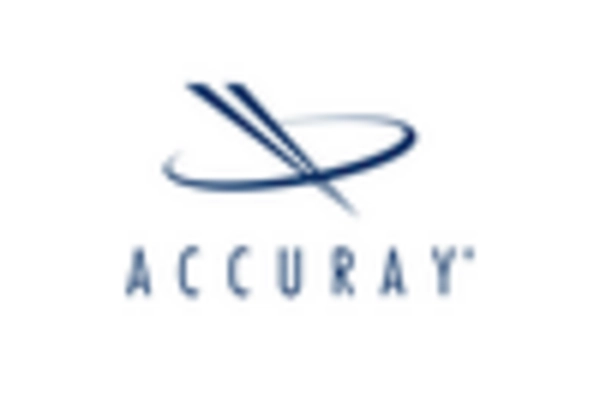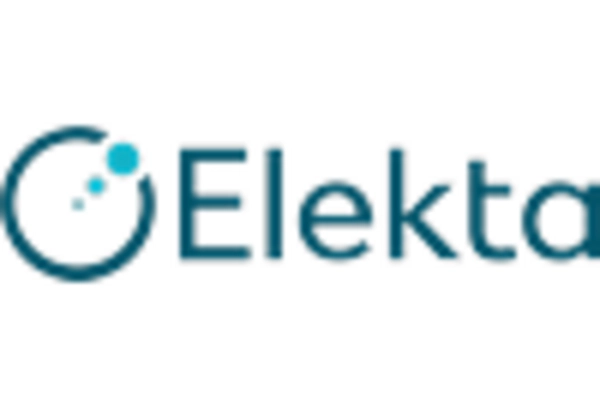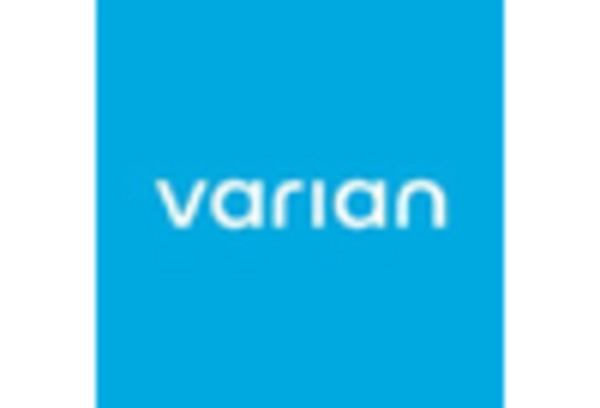Rising Incidence of Cancer
The increasing prevalence of cancer worldwide is a primary driver for the Tumor Tracking System Market. According to recent statistics, cancer cases are projected to rise significantly, with estimates suggesting that by 2030, there could be over 21 million new cancer cases annually. This alarming trend necessitates advanced tracking systems to monitor tumor progression and treatment efficacy. As healthcare providers seek to enhance patient outcomes, the demand for sophisticated tumor tracking solutions is likely to escalate. The Tumor Tracking System Market is thus positioned to grow as healthcare systems invest in technologies that facilitate early detection and personalized treatment plans, ultimately aiming to improve survival rates and quality of life for patients.
Increased Healthcare Expenditure
Rising healthcare expenditure across various regions is a crucial factor propelling the Tumor Tracking System Market. As governments and private sectors allocate more resources to healthcare, there is a corresponding increase in funding for cancer research and treatment technologies. This financial commitment is likely to enhance the development and implementation of tumor tracking systems, which are essential for effective cancer management. The Tumor Tracking System Market stands to benefit from this trend, as healthcare facilities invest in advanced technologies to improve patient outcomes and streamline treatment processes. Enhanced funding may also lead to collaborations between technology providers and healthcare institutions, further driving market growth.
Growing Demand for Personalized Medicine
The shift towards personalized medicine is significantly influencing the Tumor Tracking System Market. As treatment approaches become more tailored to individual patient profiles, the need for precise tracking of tumor responses to therapies is paramount. Personalized medicine relies on detailed data regarding tumor genetics and behavior, which can be effectively monitored through advanced tracking systems. This trend is expected to drive investments in tumor tracking technologies that facilitate real-time monitoring and adjustments to treatment plans. Consequently, the Tumor Tracking System Market is poised for growth as healthcare providers increasingly prioritize personalized approaches to cancer treatment.
Technological Advancements in Medical Imaging
Technological innovations in medical imaging are transforming the landscape of the Tumor Tracking System Market. Enhanced imaging modalities, such as MRI, CT scans, and PET scans, provide detailed insights into tumor characteristics and behavior. These advancements enable healthcare professionals to track tumor changes with greater precision, leading to more informed treatment decisions. The integration of imaging technologies with tumor tracking systems is expected to enhance diagnostic accuracy and treatment monitoring. As a result, the Tumor Tracking System Market is likely to witness increased adoption of these advanced imaging solutions, which are essential for effective cancer management and patient care.
Regulatory Support for Cancer Treatment Innovations
Regulatory bodies are increasingly supporting innovations in cancer treatment, which is positively impacting the Tumor Tracking System Market. Initiatives aimed at expediting the approval of new cancer therapies and tracking technologies are fostering an environment conducive to market growth. Regulatory frameworks that encourage the integration of advanced tracking systems into clinical practice are likely to enhance the adoption of these technologies. As healthcare providers seek to comply with evolving regulations, the demand for effective tumor tracking solutions is expected to rise. This regulatory support is crucial for the Tumor Tracking System Market, as it paves the way for the introduction of innovative solutions that improve patient care and treatment outcomes.















